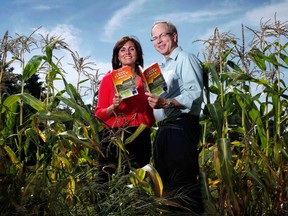
Article content
A 208-year-old publication that farmers, gardeners and others keen to predict the weather have relied on for guidance will be publishing for the final time.
THIS CONTENT IS RESERVED FOR SUBSCRIBERS ONLY
Subscribe now to read the latest news in your city and across Canada.
- Exclusive articles from Barbara Shecter, Joe O'Connor, Gabriel Friedman, and others.
- Daily content from Financial Times, the world's leading global business publication.
- Unlimited online access to read articles from Financial Post, National Post and 15 news sites across Canada with one account.
- National Post ePaper, an electronic replica of the print edition to view on any device, share and comment on.
- Daily puzzles, including the New York Times Crossword.
SUBSCRIBE TO UNLOCK MORE ARTICLES
Subscribe now to read the latest news in your city and across Canada.
- Exclusive articles from Barbara Shecter, Joe O'Connor, Gabriel Friedman and others.
- Daily content from Financial Times, the world's leading global business publication.
- Unlimited online access to read articles from Financial Post, National Post and 15 news sites across Canada with one account.
- National Post ePaper, an electronic replica of the print edition to view on any device, share and comment on.
- Daily puzzles, including the New York Times Crossword.
REGISTER / SIGN IN TO UNLOCK MORE ARTICLES
Create an account or sign in to continue with your reading experience.
- Access articles from across Canada with one account.
- Share your thoughts and join the conversation in the comments.
- Enjoy additional articles per month.
- Get email updates from your favourite authors.
THIS ARTICLE IS FREE TO READ REGISTER TO UNLOCK.
Create an account or sign in to continue with your reading experience.
- Access articles from across Canada with one account
- Share your thoughts and join the conversation in the comments
- Enjoy additional articles per month
- Get email updates from your favourite authors
Sign In or Create an Account
or
Article content
Farmers’ Almanac said Thursday that its 2026 edition will be its last, citing the growing financial challenges of producing and distributing the book in today’s “chaotic media environment.” Access to the online version will cease next month.
Article content
Article content
Article content
The Maine-based publication, not to be confused with the even older Old Farmer’s Almanac in neighboring New Hampshire, was first printed in 1818. For centuries it’s used a secret formula based on sunspots, planetary positions and lunar cycles to generate long-range weather forecasts.
Article content
By signing up you consent to receive the above newsletter from Postmedia Network Inc.
Article content
The almanac also contains gardening tips, trivia, jokes and natural remedies, like catnip as a pain reliever or elderberry syrup as an immune booster. But its weather forecasts make the most headlines.
Article content
“It is with a heavy heart that we share the end of what has not only been an annual tradition in millions of homes and hearths for hundreds of years, but also a way of life, an inspiration for many who realize the wisdom of generations past is the key to the generations of the future,” Editor Sandi Duncan said in a statement.
Article content
In 2017, when Farmers’ Almanac reported a circulation of 2.1 million in North America, its editor said it was gaining new readers among people interested in where their food came from and who were growing fresh produce in home gardens.
Article content
Many of these readers lived in cities, prompting the publication to feature skyscrapers as well as an old farmhouse on its cover.
Article content
Advertisement 1

.jpg) 3 hours ago
2
3 hours ago
2
 English (US)
English (US)